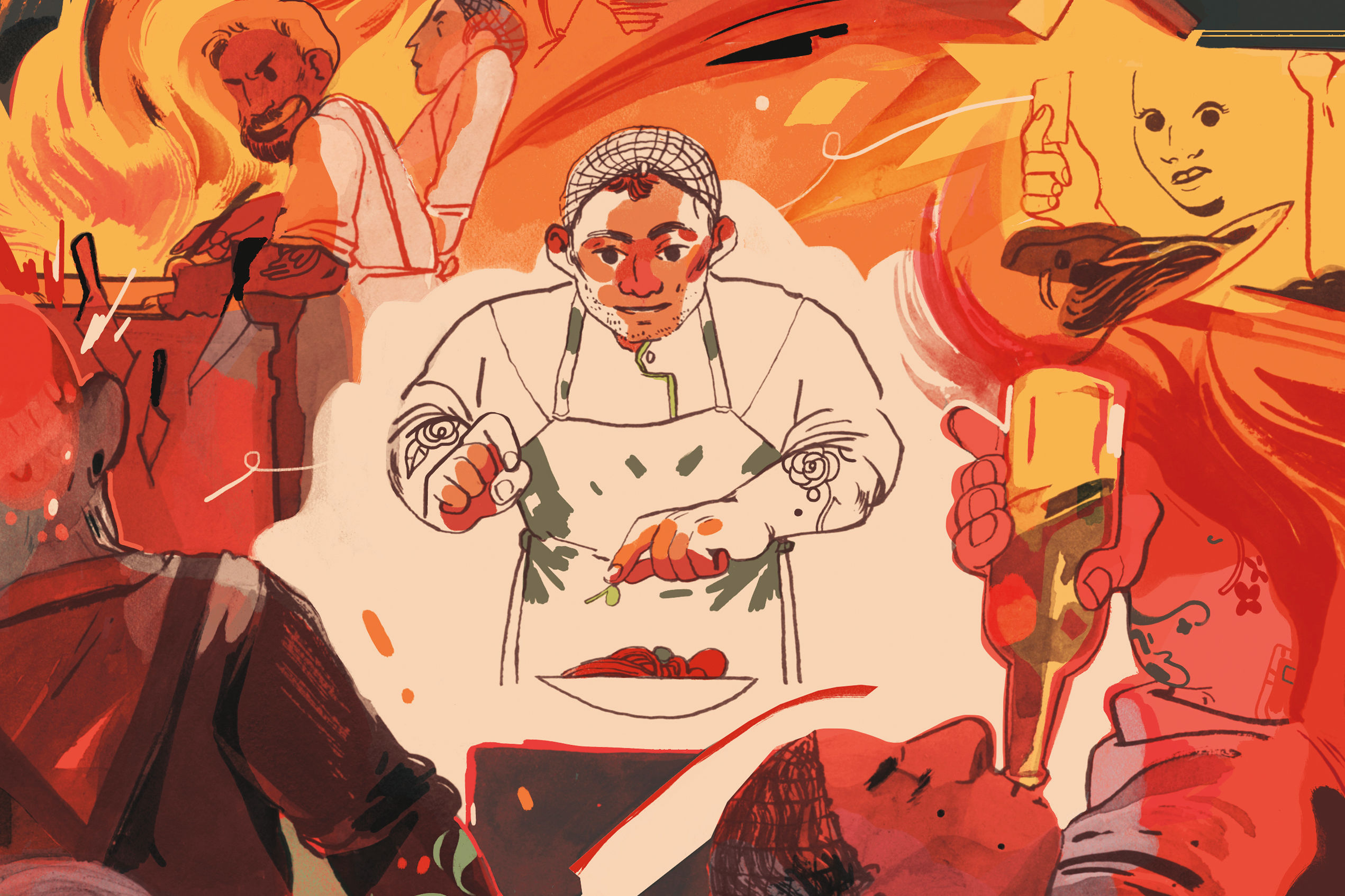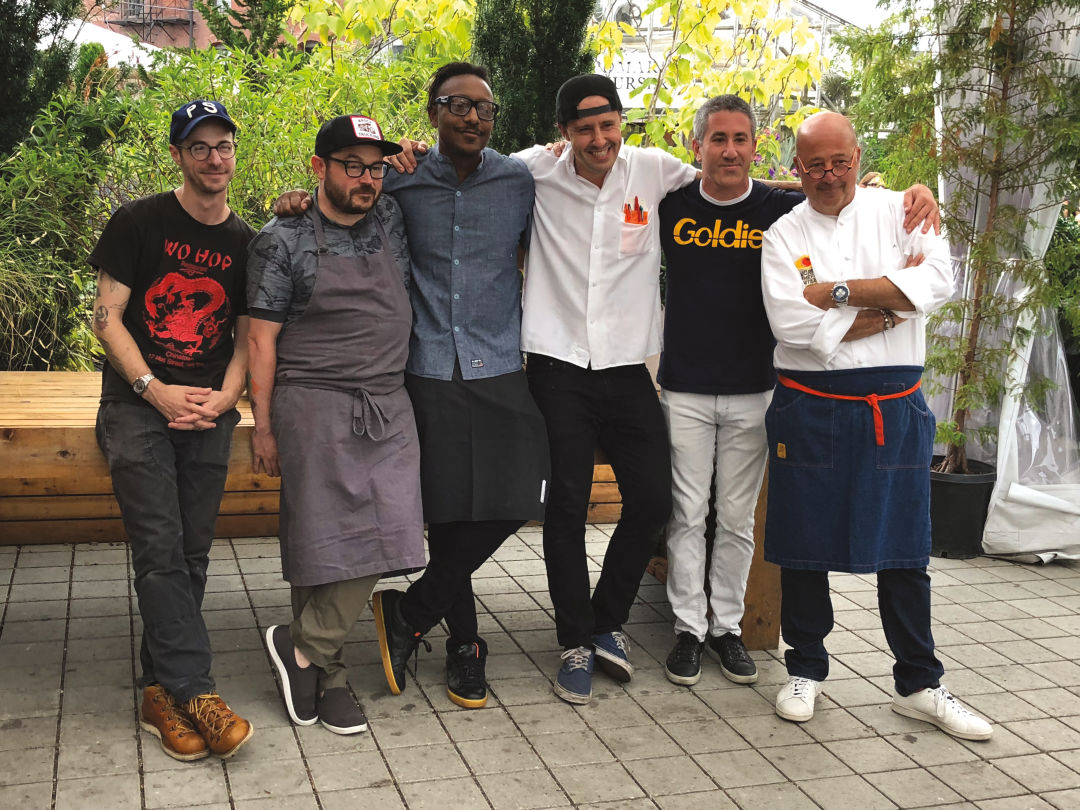
Kitchen Consequential
The year is 2009, and Portland is all-out food drunk, high on rule-bending restaurants, food cart pod parties, and foie gras fever. In scrappy Southeast, Bunk Sandwiches’ extreme working-class hoagies are blipping on the national map, thanks to the stoner-dude palate of Tommy Habetz. Over in Northeast, the women of Beast have set the table for a new supper club culture, Julia Child meets riot grrrl. Striding through pioneering downtown cocktail bar Saucebox is Gregory Gourdet—massively mohawked, gay, Haitian American, and flashing a fancy-pants cooking résumé from New York’s Jean-Georges. Meanwhile, food-world heavyweights flock to Le Pigeon on gritty East Burnside, ready to eat whatever ideas pop out of the free-riffing brain of 27-year-old gastrobasher Gabriel Rucker ... often brains themselves, stuffed into lamb’s-head shepherd’s pie.
It was a new postcard vision of America’s most original food destination: Portland as one eternal, chicken-fried feast, cooked up by a Rock ’n’ Roll High School of party-loving youths curing illicit salami in bathtubs and trashing traditional white-tablecloth dining culture, as craft beers and artisanal spirits flowed like the Willamette River. “I was just a kid, drinking on the line, breaking the rules,” says Rucker, summing up the life back then, being his own boss, on his own terms.
But that’s only half the story.
Flash forward to 2019, and more hidden tales emerge; of disasters, broken relationships, and near-death experiences born from the scene’s other constant: an ongoing battle with substance abuse. Rucker is now in Alcoholics Anonymous. His wake-up call came in 2013, two years after winning the prestigious James Beard Rising Star award: he showed up wasted at Powell’s Books during his Le Pigeon cookbook tour, then rolled off his living room couch, three bottles in, right over one of his young kids. Gourdet, now chef at downtown’s swanky Departure, is known as much for his marathon-running sobriety as for his Top Chef TV stint, but it followed a seven-year run of smoking meth and one very flipped car. In 2015, after departing as Beast’s second-in-command, Mika Paredes overdosed on booze and pills at age 31, then waged an emotional GoFundMe campaign for rehab funds. They’re not alone. A growing number of Portland restaurant insiders are rethinking what it means to live and work in a kitchen, and, for some, booze, weed, and hard drugs are no longer part of the recipe.
This past November, Habetz (a.k.a. “Puff Daddy”) earned his first “30 days sober” chip from AA himself—just after starring in a full-page magazine ad that pictured him skillet-frying a mountain of “farm fresh” cannabis buds with a wicked grin. “I was high all day, high when I came up with Bunk Sandwiches, high when came up with Pizza Jerk,” he told me one morning. “I thought, ‘See, it’s good. I’m being my most creative self.’ I lied and made excuses for years, to others and myself. My son’s Halloween costume this year was a hobo with a blunt hanging from his mouth. I thought, ‘Is this how he sees me? Is this what he’ll grow up to be?’ It was devastating. A reckoning had to come. Evolve or die.”
Locally and nationally, excess is all but baked into contemporary kitchen culture, the pop culture–anointed, Sriracha-slathered heir to the music world’s mystique of sex, drugs, and rock ’n’ roll. Not every restaurant or cook goes off the rails, an important distinction to make. But according to government data, food service routinely dukes it out with mining and construction as the profession with the highest rates of drug and alcohol disorders, in part because of easy access to in-house liquor. Now add in Portland, a youthful city that glamorizes dive bars and drunk culture. Talk to industry folks around town and a picture emerges: long hours, high anxiety, and mental health issues simmering inside a macho culture jacked on adrenaline. Got a problem? Go cry in the walk-in. Sliced off your thumb? Deal. Just don’t bleed on the food. Surviving your shift is a tribal rite, celebrated with shots after hours. Pass out. Wake up. Repeat,
Call it the Anthony Bourdain effect. In 2000, the Parts Unknown travel TV star (who committed suicide last year) wrote Kitchen Confidential, a sardonic exposé of New York’s restaurant underbelly, seen through the eyes of young cooks like himself, hopped up on dope, crazy antics, and brutal hours. Kitchen service began with brandy-flaming reenactments from Apocalypse Now, complete with the Doors blaring, “This is the end, my only friend.” Bourdain framed his crew as downtrodden food warriors, high all the time, bonded by honor and glory and “truly happy, a band of brothers, like Henry V’s lucky few.” The media ate it up.
“Kitchen Confidential was our bible, the template,” says Rucker. “Bourdain was our poster boy. It’s like saying to a musician: ‘If you want to be successful, be like Keith Richards.’ For all the cooks in my generation, he made it OK to love the lifestyle. You looked up to it. It’s what you did.”
The conversation around chefs and sobriety had a small but vital breakthrough last September inside a fancy Northwest Portland greenhouse, somewhere between seaweed-buttered caviar toasts and a stunning Haitian chocolate dessert. Around 70 souls gathered for Zero Proof, a once-in-a-lifetime Feast Portland festival dinner by five trailblazing cooks: Southern food revivalist Sean Brock, Philly’s modern Israeli thinker Michael Solomonov, Bizarre Foods TV host Andrew Zimmern, and Portland’s Rucker and Gourdet. The hitch? No alcohol. Diners expect obligatory hellos at a $225 meal. What they got: a Justice League of culinary superheroes, all sober and standing together, making a surprisingly public call for a healthier, less toxic industry. One by one they revealed their stories, raw and emotional, like an impromptu AA meeting.
“We all struggle,” said Rucker. “We want to lead by example; we don’t have to be hard-partying guys.”
“This is historic,” added Solomonov, who battled crack addiction early on at his now-legendary Zahav. “The days of whispering, excuses, and sweeping things under the rug are over.”

Feast Portland’s ”Zero Proof” sober dinner crew: (from left) bartender Evan Zimmerman with chefs Sean Brock, Gregory Gourdet, Gabriel Rucker, Michael Solomonov, and Andrew Zimmern
Image: Karen Brooks
Word of the dinner spread quickly, as Zero Proof chefs saw their social media feeds light up with kudos and queries from cooks around the country: “How can I do this? How do you get through the shift?” Talking in the open is a sea change, says Olympia Provisions’ head chef Eric Joppie, who went sober in 2007 after one too many drug-fueled shifts sent him into cardiac arrest in California. Later, he avoided talking up sobriety, for fear of alienating other cooks. “I was almost apologetic about it,” he admits. “This is pretty recent, people proudly waving a flag, taking a stance.”
No single reason can explain the sober shift, although close calls with the Grim Reaper, hitting middle age, and having kids play a huge part for many. But in a bigger sense, health is hot right now in mainstream culture, goat yoga to plant-based dining to personal boxing coaches. Rucker, for one, has gone full Creed, chronicling his daily workouts on Instagram as @fitchefpdx.
Joppie points to another welcome trend: more bars serving no-proof drinks, making it easier for everyone to join the party without the stigma of ordering a “Martinelli’s sparkling cider.” Ace bartender Eric Nelson, the creator of Portland’s hot bar pop-up Shipwreck, is on the forefront of the local no-proof movement—he’s actually sober, too, after a decade of hard boozing. Working at Trifecta five years ago, he’d wake up, take his kids to school, then hit New Seasons before 10 a.m. to buy wine, “drinking enough to hold on to get to my shift.” “No one knew,” he confides. “We’re the best actors and liars.” After a horror show of alcohol-induced seizures and defecating blood he entered rehab in 2014.
Today, Nelson says he’s never been more successful in life or career. “I want more happiness,” he shared recently, while sipping a beet fizz. “I’m addicted to happiness.” These days he still makes inventive neotropical rum drinks, but next-level no proof cocktails will also get top billing at EEM, the “Thai barbecue cocktail bar” he’s opening this winter on North Williams with the owners of Langbaan and Matt’s BBQ. It’s an odd match, a recovering addict serving drinks, but he’s not sanctimonious: “Not everyone has a problem. I love the spirit of drinking, people toasting ... just not waking up chugging a bottle.”
Change is slow, though many chefs and restaurant owners (sober or not) are acutely aware of the need for a healthier kitchen culture, including discussions around depression, #MeToo harassment, and substance abuse. One topic on the table: tackling the issue of “shift drinks”—the industry’s tradition of rewarding employees at shift’s end with a shot and a beer. (Note: no one hands me a Fernet when I turn in a story.)
Some places are rethinking or disbanding shift drinks altogether: at Olympia Provisions, Joppie helped launch a “wellness initiative” with the option to earn tokens for yoga classes or spa treatments instead of shots. At Departure, Gourdet shuns shift drinks but actively books one-on-one time with cooks, going to dinner and talking future goals. “Jean-Georges never asked me to coffee,” he says with a grin. But the vanguard is up north at Seattle dining icon Canlis, which rejects boozy bonding for full-throttle staff fun: wee-hours poker games, “truly tasteless movie nights,” and after-work laser tag in the restaurant. “We got rid of shift drinks 15 years ago,” says co-owner Mark Canlis. Restaurant owners, he observes, have been slow to recognize employees as people rather than soldiers. “It’s not just performing in the heat of battle, not just making 60 perfect plates,” he stresses. “If that cook is a disaster, living in emotional poverty, what’s the point? Building culture is an everyday process. You can’t just pull out a Ping-Pong table and have culture.”
Likewise, you can’t easily pull the culture out of the shift drink and all that goes with it: the pressure-cooker environment and limited post-work entertainment options beyond bars, not to mention low pay, which precludes, some might argue, #livingyourbestlife. Add to that the obvious social pressure to drink. “In the beginning it’s really isolating,” says Paredes, who now cooks at Thistle, a quiet, locavore kitchen in McMinnville. “You have to reconstruct everything. The hardest part was doing karaoke, sober. It took time to realize I may be sober, but I’m not square.”
The missing piece right now? An industry support group, a clubhouse, a safe space to talk freely about these tough issues—for Portland cooks, by Portland cooks. The answer may come from Rucker and Gourdet, captured in an Instagram shot in early December, arm in arm, grinning like those boys in The Sandlot. The caption: “Planning something and it’s not your next meal.” That would be a Portland branch of “Ben’s Friends,” the South Carolina–founded chef recovery group named for Ben Murray, a chef who committed suicide after years of alcohol abuse. The program is loosely based on AA, but with less structure—no higher power or “steps.” They hope for a February launch of the local chapter, with weekly meetings at Jacobsen Salt Co’s warehouse in Southeast. “It’s life or death for many of us,” says Gourdet. He envisions a comfortable place where sober chefs can connect, but also where struggling cooks, not ready to jump into AA or rehab, can find hope and inspiration from people who understand their battle.
“I want to plant a seed. I can see longevity now,” says Rucker, fired up about being a sober role model for the next generation of chefs. “I want these young cooks to know what I did with my life, not just foie gras.”




